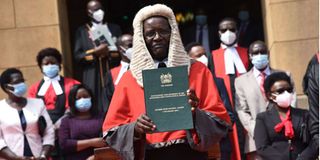Justice Maraga could have done better

Former Chief Justice David Maraga displays the State of the Judiciary report at the Supreme Court of Kenya, Nairobi, during his retirement ceremony.
What you need to know:
- At the JSC, he presided over policies, regulation, recruitment and disciplining of judges and judicial officers.
- High profile criminal cases like the Sharon Otieno and Monica Kimani murders are still making their tortoise journey along the corridors of justice.
Now that Mr David Maraga has retired from position of Chief Justice, many Kenyans will review his tenure to gauge his legacy. The Chief Justice actually retired from four roles — as the chairman of the Judicial Service Commission, a Judge, president of the Supreme Court and the administrative head of the Judiciary.
At the JSC, he presided over policies, regulation, recruitment and disciplining of judges and judicial officers. There was no noticeable change in the conduct of the officers and recruitment was focused on High Court Judges which led to conflict with the Executive.
Critics also point out that the case backlog was at magistrates’ courts where more officers were needed, and not the High Court. There was no framework of deliverables in the Judiciary, thus Kenyans could not predict the duration of cases.
At the Judiciary, Kenyans had the expectation that as a long serving Judge, he had first-hand knowledge of the causes of the slow pace of the determination of cases. Mr Maraga left cases that he found in court and many more were added to the heap. Of note are corruption cases linked to Goldenberg, Anglo Leasing, NYS scandals, Arror and Kimwarer dams and many others.
High profile criminal cases like the Sharon Otieno and Monica Kimani murders are still making their tortoise journey along the corridors of justice. There is no known reason why the courage shown by the Judges while determining political disputes wanes when dealing with criminal cases.
The Supreme Court stands at the apex of the entire Judiciary apparatus. It has the task of identifying the gaps in the law and the Constitution and, by their rulings and opinions, they stimulate enactment of suitable laws, so that the decisions prescribed by the law are not only legal but also fair, right and just. There was no cure for the stand-off in the appointment of Judges and what happens if the Executive refuses to accept JSC nominees. Mr Maraga’s Supreme Court has not done well in this regard.
While resource constraints are cited for the lack of stellar achievement by Mr Maraga, I believe that providing quality leadership and harnessing the abilities of the Judges to realise a fair, right and just law regime requires no more than the emoluments granted to the Chief Justice's office.
The court also lacked consistency in its rulings. A case in point is the different outcomes in the two 2017 Presidential elections, where the repeat elections results were allowed to stand despite having more challenges than the first one.
As the administrative head of the Judiciary, lack of devolution of Justice System and the usual haphazard transfer of Judges and magistrates complicated the hearing of many cases.
Mr Maraga appeared to view the independence of the Judiciary only in terms of financial endowment while not appreciating the most important facet, which is non-interference in the determination of matters before it.
John Nyaga, Nairobi




